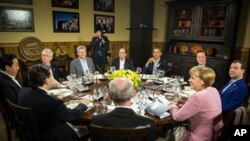At the recent Camp David G-8 meeting, leaders agreed to take additional steps to support Arab transitions underway. The G-8 first began such work at the 2011 G-8 meeting in Deauville to support countries in the Arab world engaged in transitions toward “free, democratic and tolerant societies.” Countries receiving support include Egypt, Jordan, Libya, Morocco, and Tunisia.
At Camp David, the G-8 agreed to assist these countries stabilize their economies by supporting financing through the International Monetary Fund and bilateral assistance to promote sustainable economic growth. The G-8 will also encourage direct assistance through the World Bank, African Development Bank, the European Investment Bank and other financial institutions.
Job creation is critical to sustaining the political transitions underway. The G-8 will therefore, lead the effort to complete the charter change necessary for the European Bank for Reconstruction and Development to be able to invest up to $1.3 billion this year and up to $4 billion over the next three years. The goal is to support broad based private sector development, including the financing of small and medium sized enterprises and the creation of much-needed jobs.
North African and Middle East countries in transition have also requested help with reforms that promote transparency, accountability, and good governance. To meet this need, the G-8 will facilitate the recovery of stolen assets stowed abroad. The G-8 will also help each transition country join the Open Government Partnership -- a multilateral initiative that aims to secure commitments from governments to promote transparency, empower citizens, fight corruption, and harness new technologies to strengthen governance.
To assist Middle East and North African countries in transition to increase their capacity for trade and investment, the G-8 has agreed to launch bilateral and regional trade initiatives to expand market access, lower barriers to trade, and promote increased trade between transition countries and the G-8. This includes, among others, the United States’ Middle East and North Africa Trade and Investment Partnership.
The recent uprisings across North Africa and the Middle East have highlighted the aspirations of the people of the region for human rights, economic opportunity, and democracy. The G-8 countries, including the United States are committed to seeing these aspirations fulfilled.
G-8 Helps Arab Countries In Transition

At the recent Camp David G-8 meeting, leaders agreed to take additional steps to support Arab transitions underway.



